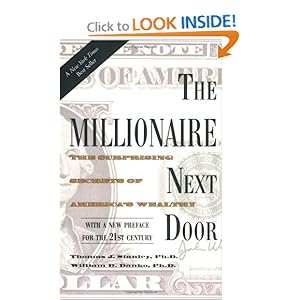 Review by Eric R. Severson, Esq., Wellington, Florida
Review by Eric R. Severson, Esq., Wellington, Florida
Book by Thomas J. Stanley, Ph.D. and William D. Danko, Ph.D.
“Whatever your income, always live below your means.” Stanley & Danko, The Millionaire Next Door at 161. This simple rule is very hard to live by in our high consumption society. My wife and I have three young children and are very concerned with our society’s desire to display high social status (e.g., big houses in fancy neighborhoods, luxury cars and clothing, etc.) and our children’s perception of that. This book reinforces the idea of saving for our own good and instilling those ideas in our children.
The authors of The Millionaire Next Door have spent over twenty years studying how people become wealthy. Their research uncovered the following seven common denominators among those who successfully build wealth:
- They live well below their means.
- They allocate their time, energy, and money efficiently, in ways
conducive to building wealth. - They believe that financial independence is more important than
displaying high social status. - Their parents did not provide them economic outpatient care.
- Their adult children are economically self-sufficient.
- They are proficient in targeting market opportunities.
- They chose the right occupation.
Stanley & Danko, The Millionaire Next Door at 3 – 4.
The authors came up with a formula to determine whether one is wealthy or not:
“Multiply your age times your realized pretax annual household income from all sources except inheritance. Divide by ten. This, less any inherited wealth, is what your net worth should be.” Stanley & Danko, The Millionaire Next Door at 13. From this equation, the authors have classified the two extremes as prodigious accumulators of wealth (“PAW”) or under accumulators of wealth (“UAW”). Boiled down to its essence, the over arching rule to follow to become a PAW is to live below your means. The authors spend time explaining the correlation between living below one’s means and being a PAW through case studies, giving examples of how PAWs live below their means, explaining how one becomes a PAW, and teaching how best to pass this lifestyle down to their descendants.
I would recommend this book to everyone from young adults just starting their careers to grandparents desiring to teach their children and grandchildren the importance of self-control and saving. My only criticism would be that the numbers used in the tables are outdated. For example, Appendix 2 provides estimated price per pound for 1996 motor vehicles. I also question Table 2-2 on page 44 detailing the credit cards held by millionaire household members. I would think that today’s millionaires are holding different credit cards than they were in 1996 taking into consideration discounts various businesses use to entice customers to shop at their stores and use their credit services (e.g., Macy’s and Target). However, the lessons imparted are even more important now than they were when the book was first published.


